Textiles Area
Contents
General Information
MakeICT's Textiles area is in the front part of the makerspace across from the Artist/Maker Studios. This area was created and setup by Studio Arts BD Jess Bechtelheimer, Geoff Kisch and a handful of other volunteers in 2016. It has several home sewing machines, small looms, irons, padded work table for ironing and pinning, a fold down murphy cutting board (soon to be installed), mannequins, a full-length 3-way mirror, a serger, an industrial sewing machine, and more.
Donations are currently being accepted in the form of fabric, thread, machine needles, sewing/fabric scissors/shears, large lint roller refills, distilled water, sewing notions (such as zippers, buttons, etc), adjustable dress forms & mannequins, pins, bobbins, hand sewing needles, yarn, tape measures. etc.
Malissa Long is the new Textile Area Lead for 2017.
Access Policy
(Approved by the MakeICT board 2016 December 04)
- Those who wish to access the textile room must read and follow the Textile Room Guidelines posted on the Wiki. (The guidelines will likely be updated and evolve over time. Users are expected to review and comply with the current guidelines.)
- Use of the equipment requires authorization by one of the approved authorizers listed on the wiki.
Textile Room Guidelines
Guidelines will be updated periodically at the discretion of the Textile BD.
The Room
- The Textile Room is a CLEAN SPACE. No food, drinks, or any other messy/dirty/liquidy/greasy substances, including yourself, are allowed in the room.
In particular, do not place anything besides the clothes iron, clean laundered fabric, pins and notions on the padded work table. If something has been on the floor or anywhere dirty, it should not be on the work surface.
- Put things back where you got them (or put them in their proper place if someone else happened to leave them out).
- Clean up after yourself. (Lint roll the table, sweep, etc)
- Children under 8 are not permitted in the room.
Ironing:
- The padded table is for ironing and pinning projects together. Do not cut fabric on the padded surface.
- Always use the distilled water provided in the Textile Room to fill the irons and spray bottles.
- When using steam you may want to use a barrier fabric to prevent color transfer from the table fabric to your project.
Cutting:
- Do not cut fabric on the padded table. To cut fabric, lower the Murphy Cutting Board so it lays flat on top of the padded work table and only cut on the cutting board itself.
- Use only scissors, shears or fabric rotary cutters on the cutting mat. Use a light touch when using a rotary cutter. Do not use a box/utility knife on the cutting mat.
- Textile scissors and shears have been labeled as “Fabric Only” and are only to be used to cut the following Acceptable Fabrics. Do not cut material from the Unacceptable Fabrics list below. If the material you would like to cut is not on either list, ask the Area Lead if it is safe.
Acceptable Fabrics: are woven or felted up to ⅛” thick. Some examples are cotton, linen, wool, cashmere, polyester, rayon/viscose, nylon, spandex, silk, leather... Unacceptable Fabrics: Some examples are burlap, metallic, kevlar, fur, faux fur, or anything above 12 oz per square yard… (Fur and faux fur are cut from the back side with a straight edge knife or ripped on grain.)
Sewing:
- All our current machines are previously loved and have some quirks. We will try our best to keep information on each machine on the wiki. If you learn something about a machine that is not listed, please let us know.
- If a machine is broken, place a sticky note on the machine and email the Area Lead asap so we can work to get it up and running again.
- Machine needles are available on the honor system for $1 each. Machines will typically be found without a needle. If you take or break one, please deposit the appropriate amount in the Needle Fund jar.
- Long pile furs such as rabbit require a furrier machine which we do not possess at this time.
- If using a fusible web such as Heat and Bond please use silicone on the machine needle to prevent build up while sewing.
Equipment List
| Picture | What | Manufacturer | Model | Status | Authorizers |
|---|---|---|---|---|---|
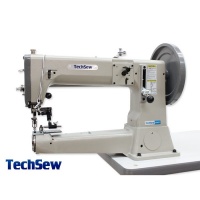 |
Industrial Sewing Machine | TechSew | 5100 | Working | Jess Bechtelheimer
Malissa Long |
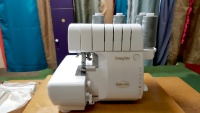 |
BabyLock Serger | BabyLock | Imagine | Working | Jess Bechtelheimer
Malissa Long |
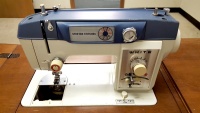 |
White 954 Sewing Machine | White | 954 | Working | Jess Bechtelheimer
Malissa Long |
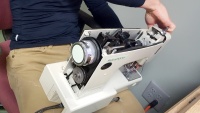 |
Kenmore Sewing Machine | Kenmore | 10690 | Not Working | -- |
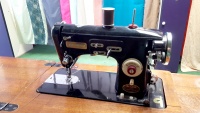 |
De Lux Sewing Machine | New Home | De Lux | Working-ish | Jess Bechtelheimer
Malissa Long |
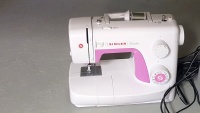 |
Singer 3223 Sewing Machine | Singer | 3223 | Working | Jess Bechtelheimer
Malissa Long |
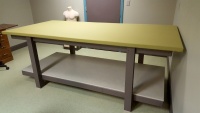 |
Padded Work Table | Geoff & Jess | 001 | Good Condition | NA - Read Guidelines |
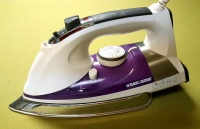 |
Iron | Black&Decker | IR1350S | Working | NA - Read Guidelines |
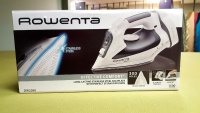 |
Iron | Rowenta | DW2090 | Working | NA - Read Guidelines |
| Murphy Cutting Board | Geoff & Jess | 001 | Not yet installed | NA - Read Guidelines |
Authorized Users
| Machine | Authorized User | Date | Authorizer |
|---|---|---|---|
| TechSew 5100 | Jess Bechtelheimer | 2016-12-28 | Jess Bechtelheimer |
| TechSew 5100 | Geoff Kisch | 2016-12-28 | Jess Bechtelheimer |
| TechSew 5100 | Paul Wilson | 2016-12-28 | Jess Bechtelheimer |
| TechSew 5100 | Tim Collins | 2016-12-28 | Jess Bechtelheimer |
| White 954 Sewing Machine | Jess Bechtelheimer | 2016 | Jess Bechtelheimer |
| White 954 Sewing Machine | Geoff Kisch | 2016 | Jess Bechtelheimer |
| Kenmore 10690 Sewing Machine | Geoff Kisch | 2016 | Jess Bechtelheimer |
| De Lux Sewing Machine | Jess Bechtelheimer | 2016 | Jess Bechtelheimer |
| De Lux Sewing Machine | Geoff Kisch | 2016 | Jess Bechtelheimer |
| Singer 3223 Sewing Machine | Jess Bechtelheimer | 2016 | Jess Bechtelheimer |
| Singer 3223 Sewing Machine | Geoff Kisch | 2016 | Jess Bechtelheimer |